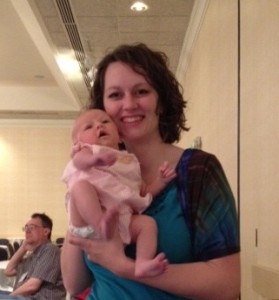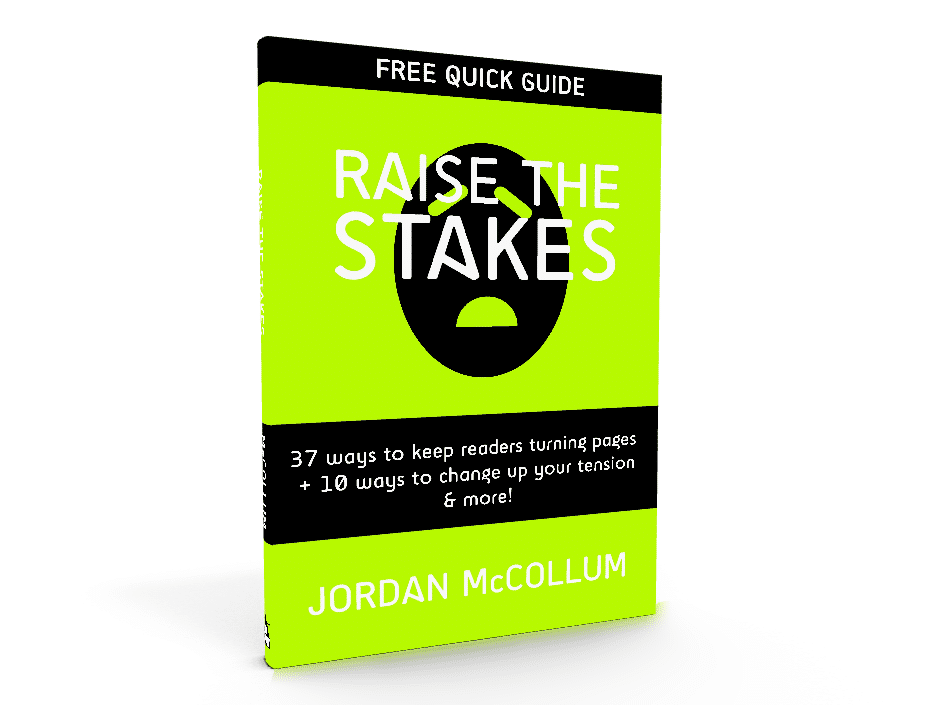Presented by Janette Rallison (blog)
There are six basic types of problems that will get you rejected: point-of-view problems, tag-line problems, motivation problems, story question problems, goal and conflict problems and sentence structure problems.
POV problems—avoid head hopping or authorial insertions. [The trend these days is deep POV in 3rd person—we’re seeing the character’s inmost thoughts, but using 3rd person pronouns. So use your character’s thoughts and vocabulary for . . . well, everything! Never put in something that character can’t know and add a scene break if you’re changing POV characters. Janette probably said all of this, but I missed the beginning of her presentation because I had to run home to feed my baby!]
Tag lines—”90% of the time, tag line should be ‘said.'” Also acceptable, when situation calls for: ask, answer/reply. [But the trend these days is to not use dialogue tags most of the time, instead using action beats to identify speakers.]
Rarely use others—if the dialogue itself can’t show how the words are said, maybe it needs to be revised. Janette gave an example of when one of her characters said something that wasn’t true, but the reader wouldn’t know that, so the line went: “I can dance ballet,” I lied. [Personally, I think it’s acceptable when you have to call attention to the manner in which it was said—specifically whispering, since there really isn’t a way to choose your words to make it read like a whisper.]
Instead of using adverbs or specialized dialogue tags, let the dialogue speak for itself and translate it into actions [those action beats I was telling you about earlier!]. These show so much more powerfully! Janette’s example:
DON’T: “I never want to see your cheating face again,” he yelled angrily.
DO: He ripped the alimony check out of the checkbook with numb hands. He’d written checks a thousand times—for piano lessons, Girl Scout cookies, every elementary school fundraiser that came along. This time it felt as though the ink had come from his own veins. “I never want to see your cheating face again.”
Again, the exception is to use adverbs when the dialogue contradicts tone/facts (like when someone says something cutting in a sweet tone or vice versa).
Motivation problems—Put as little backstory in first chapter as you can. In chapter one, the main character should have a problem and there should be action.
Is your main character an idiot? [We have an acronym for this: TSTL—it means does your character do things that, say, if you saw them in a movie, you would be screaming at the television, “No! Don’t go into that dark attic!”? (Exception: law enforcement officers, who willingly run into danger for us every day. But even they don’t go looking for it if they don’t have to!)]
Story question problems
Your story should have:
- Character
- Problem—start story on the day your character’s life changed.
- Goal—the character has to be proactive, to have direction in life, instead of merely reacting
- Obstacles—don’t use coincidence to get people past their obstacles—use it to get people into trouble, but not out!
- Antagonist—someone or something that opposes main character’s goals: man v. man, man v. nature, man v. self. The stronger the antagonist, the more intense and exciting the story will be.
- Consequences of failure—there has to be a reason why they can’t just give up (this can be the antagonist)
“Fiction is a very dangerous neighborhood to live in.”
You can put these all together into a story question from Techniques of the Selling Writer by Dwight Swain:
When [MC] finds herself in [situation], she [goal]. But will [antagonist and obstacle] make her [consequences of failure]?
This story question should be answered at the climax.
Goal and conflict problems—Don’t let your characters wander through your books without goals. Somebody has to have a goal in every scene. [Even better—all major characters have goals in a scene and they conflict!]
No goals or conflict in a scene? Throw in obstacles, highlight the consequences of failure, hearken back to the antagonist [or give other characters in the scene conflicting goals].
Sentence structure problems—Watch for repeated backward sentences—too many get awkward. [Always vary your sentence structures. Reading aloud is the best way to find repetition like this!]
About the conference: LDStorymakers is a writing contest geared to LDS writers. The conference covers both the niche, regional publishers that cater to the LDS market as well as national publishers.
 A lot of the presentation came from my series on character arcs:
A lot of the presentation came from my series on character arcs:


